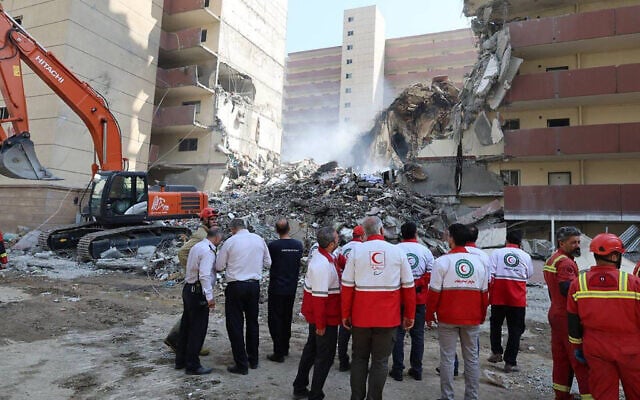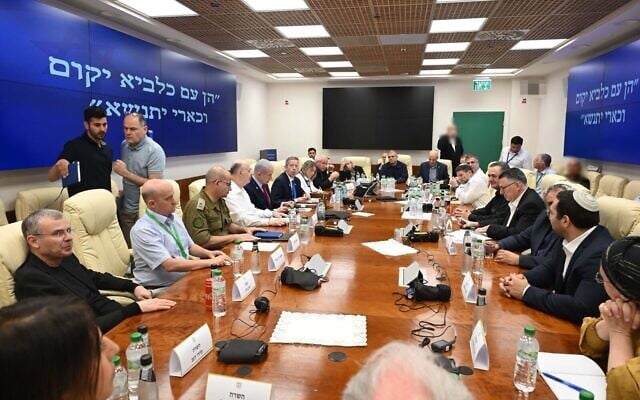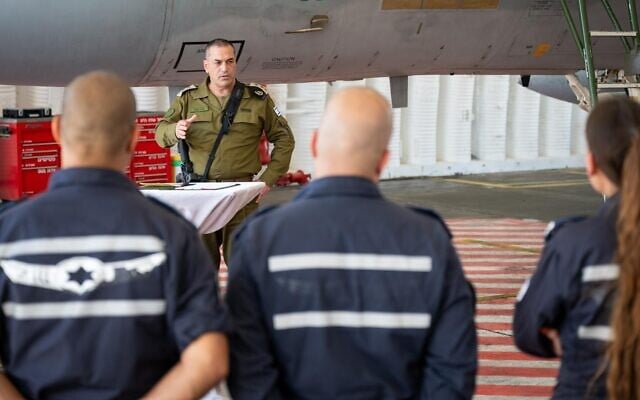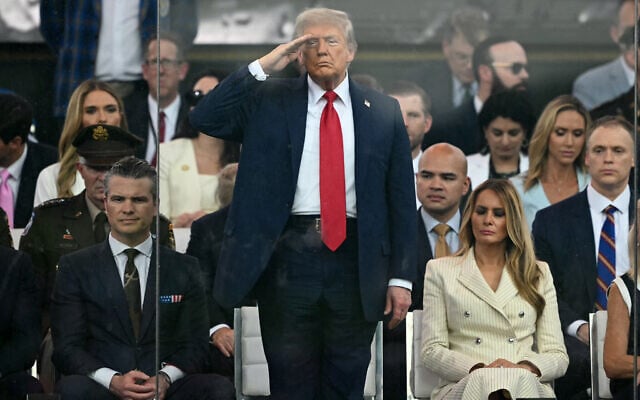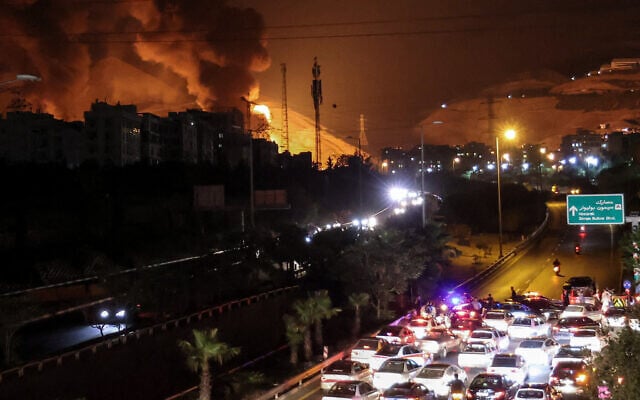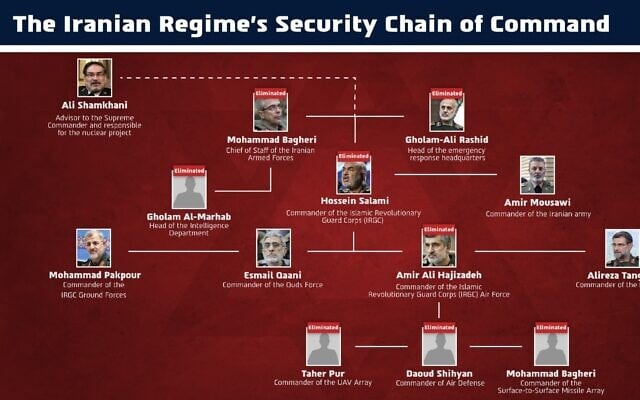


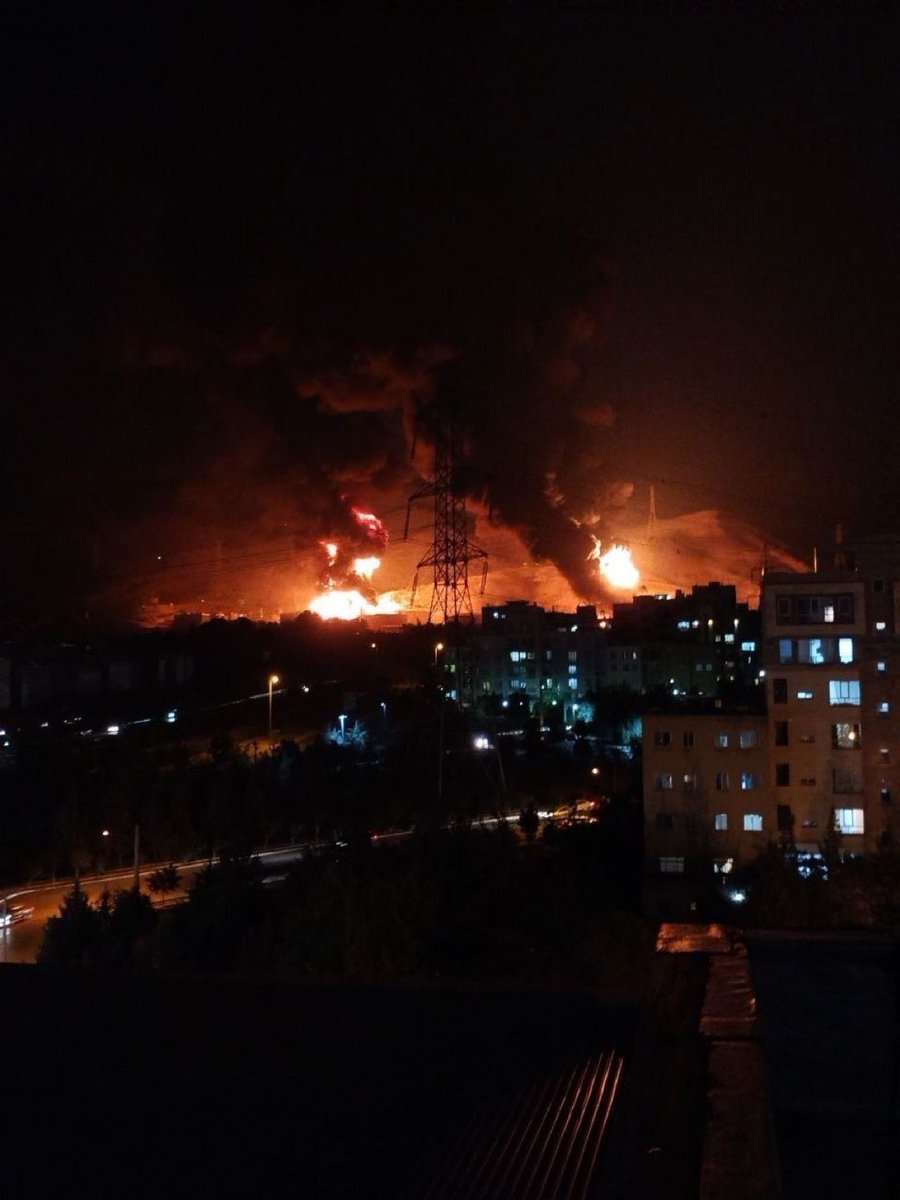
Prime Minister Benjamin Netanyahu said Saturday that Israel had “paved the way to Tehran,” amid ongoing attacks, including in Iran’s capital, against the Islamic Republic’s nuclear and ballistic missile programs, as well as reported strikes against oil fields.
“We will hit every site, every target belonging to the ayatollahs’ regime — everything that they’ve experienced until now will be nothing compared to what they will feel” in the coming days, the premier said in a Hebrew video statement.
He defined Israel’s goal in its ongoing operation as “eliminating the double threat from Iran to destroy the State of Israel” — its nuclear program and its ballistic missile program.
“Very soon, you will see IAF planes above Tehran’s skies. We will hit every target belonging to the ayatollahs’ regime,” Netanyahu added.
Israel struck two fuel depots in Tehran, the Iranian oil ministry said early Sunday morning, shortly after Iran announced the launch of a new wave of strikes against Israel. There was no immediate comment from the IDF.
In a terse post on X shortly after midnight Sunday, Defense Minister Israel Katz wrote: “Tehran is burning.”
Katz warned Saturday that “If [Iran’s leader Ali] Khamenei continues to fire missiles at the Israeli home front, Tehran will burn.”
Iranian media earlier reported a “massive explosion” following an Israeli drone strike on the South Pars gas field.
The semi-official Tasnim news agency said production of 12 million cubic meters of gas was suspended following the South Pars attack, which resulted in a fire that the Iranian oil ministry said was later extinguished.
Oil fields — crucial to Iran’s economy — were not targeted in the first round of strikes, but a senior Israeli security official warned on Friday that if Iran were to target Israeli population centers with ballistic missiles — which it then did — Israel would target Iranian regime leaders and state infrastructure such as oil refineries.
Later Saturday evening, the IDF confirmed it was conducting airstrikes on military targets in Tehran, in a statement issued as a fourth barrage of Iranian missiles was launched toward Israel. The barrage killed at least three people in the northern Arab city of Tamra.
Iranian news agency Tasnim reported early Sunday that an Israeli strike had targeted the country’s defense ministry headquarters in Tehran and damaged one of its buildings.
In “an attack on Tehran this evening by the air force of the Zionist regime, the headquarters of the defense ministry was targeted. One of the headquarters’ buildings was lightly damaged,” the agency said. The Iranian defense ministry did not comment.
An Israel Defense Forces spokesman said Saturday evening that “Air Force pilots are continuing to strike and carry out significant blows in various areas in Iran — a sequence of strikes that has not stopped for 40 hours, including over 150 targets.”
The spokesman, Brig. Gen. Effie Defrin, focused on the Iranian capital, declaring that from Tehran, “the murderous terror regime is managed, which poses a threat to the entire Western world, and that “Tehran is no longer immune.”
Following overnight strikes between Friday and Saturday on Iranian air defenses, Defrin said “hundreds of Israeli jets and aircraft are currently holding air superiority over western Iran and Tehran.”
“The aircraft are completing a wave of strikes on strategic military industry targets, nuclear program targets, and senior officials in the Iranian terror leadership,” he added.
The security cabinet met in an underground bunker Saturday night, with the meeting ongoing as of midnight.
In footage of the sit-down released by the Prime Minister’s Office, Netanyahu was joined by, among others, Defense Minister Israel Katz, Foreign Minister Gideon Sa’ar, Finance Minister Bezalel Smotrich, Justice Minister Yariv Levin, and Energy Minister Eli Cohen.
Israelis across the country were also urged Saturday to remain near protected spaces — including apartment safe-rooms or building bomb shelters, but not underground spaces that aren’t specifically designated as safe — as the country braced for further missile barrages from Iran.
Israeli officials have emphasized — in public and in private — that the country launched its campaign on Friday in order to avert an imminent, existential threat.
Channel 12 reported Saturday that IDF Chief of Staff Lt. Gen. Eyal Zamir had told Israel’s political leaders: “The operation in Iran is an operation to defend the existence of the Jewish people. History will not forgive us if we do not act now.” He reportedly added: “This is the last opportunity to effect change.”
President Isaac Herzog called on world leaders in a public address on Saturday to support Israel “in an uncompromising manner” as it fights against Iran.
“We are at a historic crossroads, for the entire Middle East — between a terrorist jihad that seeks to dominate the region and a horizon of partnership and peace, of the day after,” he said in a video address. “This is not our war alone, but of all those who seek a common future in our region.”
He stressed that the Iranian regime “has worked against us for generations, to kill us. It has worked to create global and regional terrorism, to spread antisemitism and hatred of Israel, and above all – to develop nuclear weapons — in order to realize its ambition to destroy Israel.”
He called for national unity domestically.
Netanyahu said Saturday in an English-language video statement that Tehran didn’t just want to build a nuclear bomb for itself, but rather “was planning to give the nuclear weapons that they would develop to their terrorist proxies.”
“That’s nuclear terrorism on steroids. That would threaten the entire world,” he said.
But due to Israel’s attacks, Netanyahu said, “senior Iranian leaders are already packing their bags. They sense what’s coming.”
He added that the operation has the “clear support” of US President Donald Trump, also wishing the American leader, and the US army, a happy birthday.
Trump on Saturday said that stopping the Iranian nuclear program is a prerequisite for peace and a vital US interest.
“For those people who say they want peace — you can’t have peace if Iran has a nuclear weapon,” the US president told the Atlantic. “Israel or not Israel — Iran cannot have a nuclear bomb.” He said, however, that Iran “still wants to make a deal” over its nuclear program despite the Israeli attacks.
Iran, whose leaders are sworn to destroy Israel, has publicly denied seeking nuclear weapons. However, the Islamic Republic has amassed uranium enriched to 60% — far above what is necessary for civilian use, and a short step away from weapons-grade.
Trump recently told Netanyahu that the US would consider striking Iran’s underground Fordo nuclear facility if such a move would become necessary to prevent Tehran from acquiring a nuclear weapon, Israeli journalist Barak Ravid said on Channel 12 on Saturday.
The issue will be a critical issue in the coming days and weeks, Ravid said, asserting that if Fordo survives Israeli airstrikes, Iran’s nuclear infrastructure will remain intact and Tehran could even relocate the rest of its nuclear program to the facility, placing it beyond Israel’s reach and accelerating its path to a nuclear weapon.
While Jerusalem has repeatedly condemned the Islamic Republic, leaders have stopped short of declaring an intention to topple the regime — but some officials told media outlets that this could change based on Tehran’s actions.
“There is no declared policy to bring down the regime. But if Iran continues to harm the civilian populace and cross red lines, all options will be on the table,” an Israeli official told Channel 12 on Saturday.
Deputy Minister Almog Cohen — a minor player who is not among top officials guiding the war — also posted to X calling on Iranians to rise up against the regime.
Netanyahu said Saturday that Israel had so far inflicted “serious damage” on Iran’s nuclear facilities, with the combination of strikes on physical sites as well as senior scientists delaying Tehran’s nuclear program for several years.
A senior Israeli military official echoed this assessment, saying “Iran’s nuclear project has suffered heavy blows in two main areas: Damage to the production of the weapon core through strikes on uranium enrichment and conversion sites in Natanz and Isfahan [and] damage to the regime’s weaponization group through the elimination of nine nuclear scientists,” all of whom, he said, “had, over the years, been involved in developing the nuclear detonation device.”
The International Atomic Energy Agency (IAEA) said Saturday that four critical buildings at the Isfahan site had been damaged in an attack the previous day, including a uranium conversion facility and a fuel plate fabrication plant. It added that — like in the Natanz facility — there was “no increase in off-site radiation expected.”
IAEA chief Rafael Grossi told the UN Security Council earlier that the above-ground section of the Natanz facility was destroyed. The main centrifuge facility underground did not appear to have been hit, but the loss of power could have damaged infrastructure there, he said.
An Israeli military official, speaking on condition of anonymity in line with official procedures, said that according to the army’s initial assessment “it will take much more than a few weeks” for Iran to repair the damage to the Natanz and Isfahan nuclear sites. The official said the army had “concrete intelligence that production in Isfahan was for military purposes.”
No damage has been seen at Iran’s Fordo Fuel Enrichment Plant or the Khondab heavy water reactor under construction, the IAEA said.
The IDF said it bombed an underground weapons facility in western Iran on Saturday, which it said was used by Iran to store dozens of ballistic and cruise missiles, as well as launch them.
The military released footage of air force pilots striking missile launchers at that site and elsewhere, as well as footage of strikes on Iranian troops who launched missiles. Dozens of ballistic missile launchers have been destroyed so far in Israeli strikes, the military said.
The IDF confirmed Saturday afternoon that the chief of Iran’s Islamic Revolutionary Guards Corps’ ballistic missile array, Mohammad Bagheri, was killed, as was the head of Iran’s military intelligence, Gholam-Reza Marhabi, in recent Israeli strikes.
A top adviser to Iran’s Supreme Leader Ayatollah Ali Khamenei, Ali Shamkhani, has also died from wounds sustained in Israel’s initial wave of airstrikes early Friday, Iranian state media confirmed.
In all, some 20 top military Iranian commanders have been killed since Israel launched its operation, the IDF said.
Iranian state media on Saturday also announced the death of two IRGC members in a strike on the Zarandiyeh Basij military base in central Iran.
A police chief and another officer were also killed, in a drone strike about 300 kilometres (186 miles) west of Tehran, the ISNA press agency reported, identifying them as police chief Major Habibollah Akbarian and second lieutenant Amir Hossein Seifi.
Sam Sokol, Nava Freiberg, and Leon Kraiem contributed to this report.

